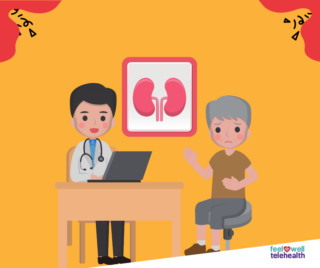5 odd facts you didn’t know about urinary infection
 Did you know urinary infection can be treated without a urine test? Did you know UTI can cause mental confusion?
Did you know urinary infection can be treated without a urine test? Did you know UTI can cause mental confusion?
First let’s define urinary infection.
The medical term is urinary tract infection, most known as UTI.
It’s the infection of your urinary track, which includes your urethra, bladder, both ureters, and kidneys. Your UTI can have bacteria growth anywhere in your urinary track but most of the time the infection will be located in your bladder.
When the bacteria go up to your kidneys your symptoms may be more severe, and you need treatment right away.
UTIs are most common in women due to their anatomic design. Their urethras are shorter and closer to the rectum, making it easier for bacteria to travel to the urinary tract. But men and children can have UTIs too, which usually require more thorough assessment.
Here are UTI common symptoms:
- Pain and burning sensation when you urinate.
- Frequent and intense urge to urinate.
- Urgent need to urinate but passing only small amounts of urine.
- Blood in the urine.
- Foul-smelling urine.
- Pressure or discomfort in the pubic region.
But keep in mind that you may experience different symptoms.
1. UTI can be treated without a urine test.
In medical and nursing school we learn that over 80% of diagnoses are made by history alone. We learn to treat the patient not the tests.
For instance, if you’re an adult and come to my office with complains of urinary pain and burning, urinary frequency and urgency you may need treatment regardless of your urinary test result. Sometimes the urine test may be negative, but you may have a subclinical urinary infection. Or maybe a false negative test.
Then you may say “antibiotics in the US should be over the counter so anyone could buy it and treat themselves” some countries allow that. But taking antibiotics without a healthcare provider assessment is dangerous.
You need a complete evaluation including history of how long you have had the symptoms, any over the counter medications taken, how many UTIs you may have had in the last 1-2 years and other associated symptoms such as back pain, urinary incontinence, blood in the urine, fever, chills. It’s important to know if you have diabetes or have had kidney stones or kidney infections in the past.
Your healthcare provider will review your current medications and allergies and check for medication interactions. Also, the clinical decision making takes into consideration, your age, gender, sexual activity, and other medical conditions. Additionally, history of any recent use of antibiotic – for UTI or any other condition is part of the evaluation.
The medication and the duration of the treatment is personalized. Even though, E. coli is the most common cause of UTI, there are several choices of antibiotic to treat them, and you will receive the prescription tailored to your own needs.
You may need a urine test sent for culture in a lab or a referral to a urologist. Especially if you don’t feel better after finishing your antibiotics. Some bacteria are resistant and need to be treated with specific antibiotics.
Many other factors play a role in the critical thinking process that only a trained and experienced healthcare provider can safely assess, diagnose, and treat.
2. Back pain can be a sign of UTI.
If you have intense back pain, especially going to one or both flanks it may be a sign your UTI has infected your kidneys. It’s called Pyelonephritis. Besides your back and flank pain you may have fever, chills, nausea, and vomiting. You should seek medical treatment as soon as possible to avoid possible serious complications affecting the function of your kidneys.
3. UTI can be present without any urinary symptoms.
This is a complicated topic. If you don’t have urinary symptoms, you usually find out you have bacteria in your urinary tract when you have a urine test for other reasons such as screening before a scheduled surgery, when you’re pregnant, or if you go to the hospital emergency room for any reason.
Most of the time you will need to be treated with antibiotics. However, other situations such as hospitalized patients, or using urine catheters for long time may have bacteria “colonized” in their bladder and they may not need to be treated with antibiotics again if they have no symptoms.
4. UTI can cause mental confusion.
Infections, including urinary tract infections, can damage your nerves and brain cells causing mental confusion. In rare cases, untreated UTIs can lead to sepsis, which is a serious generalized body infection. In those cases, you need to be admitted to a hospital for treatment with intravenous antibiotics and close monitoring.
Older people may have mild or no symptoms, delaying treatment and raising the chance of mental confusion. Fortunately, once the UTI is resolved you return to your regular mental status.
5. Sexual intercourse can prevent UTI.
Usually, you hear that too much sex may cause UTI, which may be true. However, regular sexual activity may help prevent UTIs in menopausal women. Some women have vaginal atrophy due to hormonal changes increasing the risk of UTIs. Sexual stimulation helps increase blood flow and vaginal secretions keeping the tissues healthy and decreasing vaginal dryness. Of course, if your menopausal symptoms are more severe you may need hormonal replacement and other treatments.
Here are a few things you can do to prevent UTIs:
Avoid:
- Diaphragm.
- Spermicidal jelly.
- Vaginal douches.
- Tight jeans or clothes.
- Nylon underwear.
Do:
- Drink lots of water, at least 2-3 liters – 70-100 oz a day.
- Wear cotton underwear.
- Change underwear after exercising.
- Wear loose-fitting clothes.
- Urinate as often and as soon as you feel the need.
- Make sure you empty your bladder completely each time you urinate.
- Wipe from front to back after you use the toilet.
- Urinate before and after sex.
- Take supplements such as cranberry, probiotics, vitamin C.


